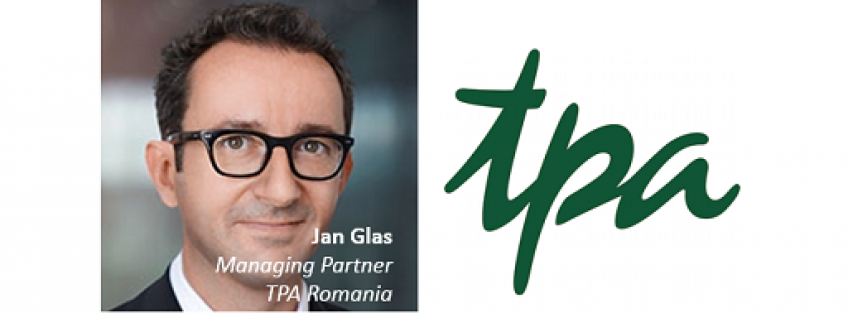NRCC Member in Spotlight - TPA Romania
Wed | 30.11.2016
Other
Meet Jan Glas, Managing Partner TPA Romania, one of the leading companies in accounting/audit/tax/legal services.
1. Dear Jan, please introduce yourself shortly to our members.
I am a Belgian citizen and I first came to Romania in 1997. Since then, I have been living and working in this wonderful country. I am the Managing Partner of TPA in Romania. We are an accounting/audit/tax/legal services firm originating from Austria that followed its clients eastwards over the past 15 years, and we are now present with more than 1.000 employees in 11 countries of Central and Eastern Europe. In Romania, we have more than 120 consultants in our offices in Bucharest and Cluj.
2. TPA has a new fresh modern visual identity. Please share us some insights regarding this rebranding campaign and your plans for 2017.
Indeed we changed our logo and brand in September this year and carry our new TPA visual with pride. It is a challenge for people working in the field of taxes and finances to talk about colours/creativity/design, so I will just say that we are very happy with what the marketing/branding people came up with. It is a fresh logo, an eye-catcher, and different from the way most advisory firms present themselves.
The change also comes at the same moment with our entry on international level into the Baker Tilly Europe Alliance. This gives us the chance to work together with high quality firms worldwide and allows us to answer requests for international assistance outside our 11 TPA countries. Baker Tilly is one of the top 8 international networks in our field and our Alliance with them is a great opportunity, both for our clients and our staff.
For 2017 we look forward to further growth in Bucharest and Cluj, and it could be that we have a first look at other cities that could become a next location for what would then become our 3rd office in Romania.
3. How important is prevention when you talk about the fiscal health of a company?
I do not think that prevention is the key-word when talking about fiscal health. It is more about having access to information (e.g. new legislation), to the correct interpretation of fiscal requirements (a challenge in a country where many laws leave space for wide interpretation), and to the adequate response to local bureaucracy. Yes, Romania does have a competitive advantage when looking at taxation, compared to most Western-European countries. But it also comes with more bureaucracy and a more short-term oriented fiscal environment. Companies have to adapt to that and this often means more in-house administrative people compared to what they are used to or more need for out-sourced assistance (be it tax consultants, accountants, lawyers).
4. IMF suggested Romania to cancel or postpone fiscal relaxation measures planned for 2017. What is your opinion on this matter?
First of all, with the upcoming parliament elections, end of this year, we have entered once more in that recurring dangerous cycle of populistic promises (higher pensions and salaries for all, lower taxes for all, more investments in infrastructure) with no real economic basis. Romania is not in a position to support these promises, and any vote casted now in Parliament on such populistic measures creates an extremely high burden on our future. As to fiscal relaxation and the view of the IMF, I agree that Romania should postpone such measures. The focus should not be on lowering the taxes for tax-payers (individuals and companies), but should mainly be on increasing the number of tax-payers, going after those companies, transactions or industries that are not part of the normal economic taxation base.
5. How do you see the Romanian business consultancy market 8 years now after the crisis?
It depends on the kind of consulting or the specific industry (e.g. real estate or energy) one was active in, but I would say that in general the accounting, tax and legal advisors had the luck of still being able to keep their heads up, also during the crisis years. Also in years of crisis, companies need to take care of their books, the taxes they pay or contracts they sign.
But that crisis period is now anyways clearly behind us. The last year we see a new serious growth pattern, similar to the years of before the crisis, with an important increase in incoming investments, a renewed real estate boom, more industrial projects, etc.
As to our advisory industry, I do believe we are going to see more mergers/integrations of firms. Where growth was previously driven from the inside (the pre-crisis years), followed by a period where consulting firms focused on survival (crisis years), companies now realise that organic growth only is not going to be sufficient. We will go into the direction of what has happened in other countries already, a series of mergers between consulting/advisory/accounting firms.
6. What are the main issues your clients face now in Romania? Are transfer prices one of these challenges?
Transfer pricing definitely is the number one fiscal topic these days. Most of the companies active in Romania have a foreign link, are part of an international group. Logically, this leads to a very high number of transactions (production, sales, management support etc) between the Romanian entity and its mother/sister companies. The Romanian fiscal authorities are correct in having a focus on how such transactions are valued and consequently on obliging companies to build up a strong transfer pricing file that can support the economic basis of such inter-group transactions. Of course, it is strongly advised to have such a transfer pricing file done pro-actively and not as the result of a control by the fiscal authorities.
Next to this tax challenge, I get clear signals from almost all our clients that their number one concern is the difficulty they encounter in hiring new people and retaining those people. It is an issue for almost all sectors, both for unqualified and qualified staff. In order to sustain the current growth, and in order to build up a normal society, Romania urgently has to find a way of activating the millions of citizens that are not economically active. It is not normal and not sustainable that out of a 20 million population, less than 6 million people work.
7. You have been for a long time the NRCC’s treasurer. How do you appreciate the chamber’s growth in the last 2 years and how do you think NRCC can add more value to its members?
TPA is a member of several bilateral chambers in Romania, but I do feel that NRCC and its network of members stands out as an example. The growth, both in members and in activities, is the result of a very strong interaction between members, board and the executive team and it clearly shows at events in how people connect within NRCC. I appreciate most that the chamber continuously comes up with new initiatives, such as the CEO Dinner, the SMEs event, but also the networking events in Cluj, Brasov or Constanta, and that it succeeds in getting its members involved.
8. In the end, please a thought for the NRCC members.
It only makes sense to be part of a chamber if you actively get involved. Therefore, I hope to see you taking part in events or even better, taking the initiative of organizing a company visit, leading a Knowledge Center, or interacting directly with other members also outside specific events.
2025
2024
-
November (1)
-
October (1)
-
July (1)
-
May (1)
-
March (1)
-
February (1)
-
January (1)
2023
-
November (1)
-
September (2)
-
August (2)
-
June (1)
-
May (1)
-
April (2)
-
March (1)
-
February (2)
-
January (2)
2022
-
December (3)
-
November (4)
-
October (3)
-
September (4)
-
August (3)
-
July (6)
-
June (4)
-
May (4)
-
April (8)
- Marketing News by diARK - April 2022
- Finance News by Mazars Romania - April 2022
- Experience the Perfect Chauffeur Transfer with David Intercar
- Mobility News by Business Lease - April 2022
- NRCC MEMBER IN SPOTLIGHT, WOLTERS KLUWER
- Crowe Romania and DeclaratiaUnica.ro engage in the automation of the single return form and the offering of personalized consultancy
- Cryptocurrency News by Bitcoin Romania, April 2022
- Legal News by BBW LAW - April 2022
-
March (6)
-
February (4)
-
January (5)
2021
-
December (3)
-
November (4)
-
October (2)
-
September (2)
-
August (1)
-
July (5)
-
June (3)
-
May (5)
-
April (4)
-
March (7)
- Cryptocurrency News by Bitcoin Romania, April 2021
- HR News by CNA International Executive Search Romania, March
- Real Estate News by CTP Invest, March 2021
- Sale-Purchase of Agricultural Land Located Outside Build-Up Areas
- MEET THE NRCC BOARD CANDIDATES 2021
- Fleet Management – Complete Makeover or Small Adjustments?
- Cryptocurrency News by Bitcoin Romania, March 2021
-
February (5)
-
January (6)
2020
-
December (2)
-
October (2)
-
September (3)
-
August (2)
-
July (6)
- NRCC Member in Spotlight Interview - Autonom
- Insolvency Proceedings: New Rules
- Member in Spotlight, UniCredit Bank
- Financing opportunities overview for large enterprises, SMEs and other organizations
- Companies: Simplification of Formalities
- Call for Leaders | What is your readiness score to benefit from the EU SURE initiative?
-
June (5)
-
May (8)
- The State of Alert. New rules for the collective proceedings
- The Retail Industry
- EU grants up to 6 Mil Euro for SME-s investment projects
- Member in spotlight, Heisterkamp Transportation Solutions
- State of Alert...What Is New
- The forced transformation of the automotive industry – Mazars analysis
- State of Alert in Romania
- Reducing the Impact of the Pandemic
-
April (6)
-
March (2)
2019
-
November (2)
-
July (1)
-
June (1)
-
March (2)
-
January (1)
2018
-
October (2)
-
September (1)
-
August (1)
-
July (3)
-
June (2)
-
May (1)
-
April (1)
-
March (3)
-
February (13)
- NRCC Elections 2018 - Elena Badea
- NRCC Elections 2018 - Loreda Dragomir
- NRCC Elections 2018 - Simina Fodor
- NRCC Elections 2018 - Manuel Herraiz Orti
- NRCC Elections 2018 - Tom Leene
- NRCC Elections 2018 - Mircea Moga
- NRCC Elections 2018 - Ronald Oort
- NRCC Elections 2018 - Razvan Pascu
- NRCC Elections 2018 - Alexandru Popescu
- NRCC Elections 2018 - Mihaela Tudor
- NRCC Elections 2018 - Loredana Van de Waart
- NRCC Elections 2018 - Edwin Warmerdam
- NRCC Elections 2018 - Philip Aarsman
2017
-
November (1)
-
September (1)
-
August (2)
-
May (1)
-
April (2)
-
March (1)
2016
-
November (1)
-
September (8)
-
June (1)
-
February (2)








